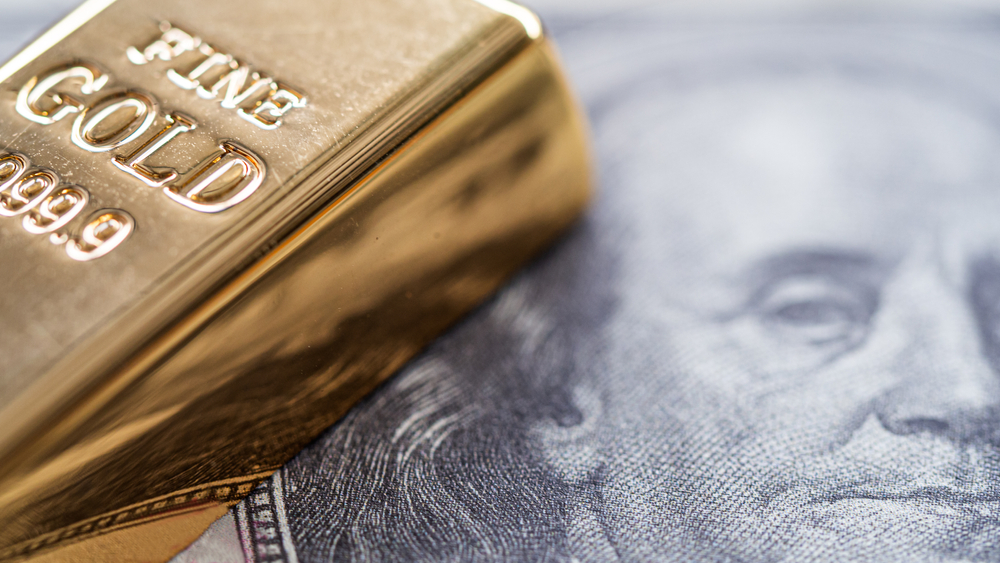Must-See TV: Who Killed the USD?
Alex Moschina|September 1, 2023

We have an idea for a new TV show.
It’s a mystery series for economists… based on real events that are happening now.
Picture this…
It’s a dark and stormy night…
Ominous music plays as we edge closer to a fancy hilltop home. Lightning crashes. We are now looking through a smashed window. A bloody scene lies on the other side of the broken glass.
The voice-over begins…
“Greetings, gumshoes, and welcome back to another thrilling episode of everyone’s favorite whodunnit. This week’s case: Who killed the U.S. dollar?“
You’re already hooked, I can tell.
Everyone loves a good mystery.
As the show goes on, we will introduce a wide-ranging cast of potential killers. Among them will be everyone from obvious suspects like China and Russia… to members of OPEC… Brazil… and even (here’s a twist) the U.S. itself.
DUN DUN DUNNN!
We know there’s a writers strike happening right now, but… there’s really no time to waste. Considering just how rapidly this real-life drama is unfolding, Hollywood needs to begin filming ASAP.
Yes, the Reserve Currency Reaper is out there… and it’s only a matter of time before he strikes!
Let me catch you up on the details of this sordid case.
Dollar Detractors Unite!
Last week, while the financial press kept a close watch on Jackson Hole, Wyoming, another clandestine meeting of the minds was being held 10,000 miles away in Johannesburg, South Africa.
At the 15th annual BRICS Business Forum, the dollar’s most outspoken detractors met to discuss just how to dethrone the greenback once and for all. Speakers included Chinese President Xi Jinping, Indian Prime Minister Narendra Modi and – via VideoLink – Russian President Vladimir Putin.
It was the biggest BRICS summit to date, with over 60 countries represented. And next year’s conference could be even bigger now that the bloc has officially invited Saudi Arabia, the United Arab Emirates, Egypt, Argentina, Ethiopia and Iran to join its ranks.
Their admissions would more than double the group’s size… and create an even more united anti-dollar coalition.
Separately, the nations are already making up ground. “The objective, irreversible process of de-dollarization of our economic ties is gaining momentum,” Putin told conferencegoers.
He’s not wrong…
USD Wannabes
While some 88% of international trade is still conducted in U.S. dollars, a growing number of nations are now flirting with introducing their own competing currencies.
At the start of the year, Brazil and Argentina announced they are developing a common currency that could eventually spread throughout South America – like a Latin American euro.
In 2021, the United Arab Emirates joined Thailand, Hong Kong and China in a cross-border digital currency project that could one day allow them to bypass the dollar.
And, fed up with sanctions, Russia and Iran are collaborating on a gold-backed cryptocurrency that could replace the U.S. dollar for international payments.
Even our close allies are getting their licks in. Traveling home from China in April, French President Emmanuel Macron told reporters that Europe should seek to reduce its dependence on the “extraterritoriality of the U.S. dollar.”
Of course, we don’t have to wait for some fancy dollar alternative to come along and steal the limelight.
The shift to a shinier, safer store of value is already underway.
Signs of De-Dollarization
Since the start of Russia’s war with Ukraine – and the intensifying Western sanctions on Russia – central banks around the world have been pouring into gold.
According to the World Gold Council, demand for the yellow metal increased by nearly 20% last year. Central bank gold buying was at a 55-year high.

At the same time, central bank holdings of U.S. dollars have dropped. Just 58% of global reserves are now held in U.S. dollars – a record low.
JPMorgan Chase pointed to the ongoing shift back in June, warning that “signs of de-dollarization are emerging.”
It’s all worked to erode the dollar’s strength over the past 12 months, during which time gold prices have jumped more than 10%.
We’ll let this chart of the U.S. Dollar Index versus gold do the talking for us…

But before we go blaming all the dollar detractors and central banks for what ails our beloved greenbacks, let’s not forget…
When it comes to instilling confidence in our currency, the U.S. may in fact be its own worst enemy…
Winning!
Even as the current administration assures us America is “winning,” the cracks are clearly emerging.
Earlier this month, for only the second time in history, the U.S. debt credit rating was downgraded by Big Three rating agency Fitch.
The House’s own budget chairman remarked, “This is a wake-up call to get our fiscal house in order before it’s too late.”
Meanwhile, the U.S. has already spent $1.6 trillion more than it has collected in revenues this year. In less than nine months, we’ve racked up a deficit that’s 122% higher than last year’s.
We’ve run a trillion-dollar-plus deficit each year since 2020, egged on by aggressive stimulus spending.
Will it end?
The real question is… Can it? And do the folks in charge have any interest in doing what’s needed to prevent the coming financial meltdown?
We already know the answer. As we saw in last week’s GOP debate, the topic of the economy ranks far below the day’s hot-button social issues.
Our leaders figure folks have no interest in hearing about the death of the dollar.
But we’ll prove them wrong.
Hollywood, we await your call.

Alex Moschina
Alex Moschina is the associate publisher of Manward Press. A gifted writer, editor and financial researcher, Alex’s career in publishing began more than a decade ago when he worked at one of the world’s leading providers of academic research and reference materials. Alex first cut his teeth in the realm of investing when he joined the team at White Cap Research in 2010. There he was charged with covering emerging market trends and investment opportunities. A stint as senior managing editor and editorial director at the prestigious Oxford Club followed. A frequent speaker at conferences and events, Alex has led educational workshops across the U.S. and Canada.





